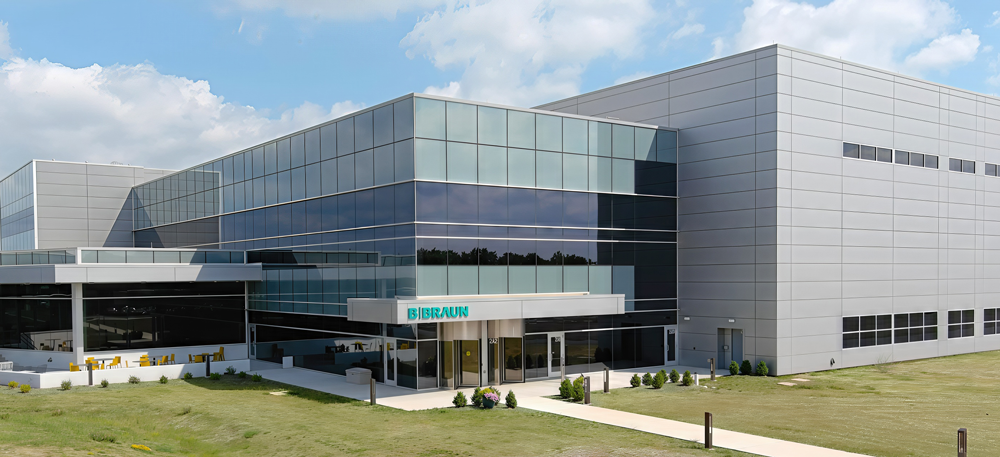Robots repairing femurs. AI being wielded to find cancer treatments. These are just a few areas of research that will be supported by the new Strategic Innovation Center (SIC) recently announced at Rowan University in New Jersey.
“Maybe one day down the road, we will have the Silicon Valley of medtech right here in South Jersey,” says Rowan University Chancellor Dr. Tony Lowman about the new expansions born out of the partnership among Rowan University, the New Jersey Economic Development Authority and venture capital firm Plug and Play. The research university plans to develop the SIC at two existing campus locations, Camden and Mullica Hill. Labs, diagnostic and R&D testing spaces for medical technologies will all be housed under this new arm of Rowan University.
“We want to have a center that could take that idea that occurs at a lab bench and provide the various tools and steps so that a faculty member at Rowan can take this discovery, partner with a clinician and come up with the next billion-dollar drug or multimillion-dollar device,” Lowman says. “Or a billion-dollar AI tool that is going to treat a major medical condition. [The SIC] is going to improve health outcomes in our region and eventually nationally and globally. The long-term play is to create a new ecosystem here in South Jersey [and show] that we are the life science driver of the region.”
New Jersey is No. 1 when it comes to top biomanufacturing hubs, according to the 2025 JLL Life Sciences Real Estate Perspective and Cluster Analysis, which also ranks the state No. 6 among top life sciences clusters, No. 8 for life sciences talent and No. 10 among startup ecosystems. The state’s rank in medtech is No. 13. But activities at Rowan and elsewhere in the state may boost that ranking in the future as the state tries to chase down top clusters in California’s Bay Area, Minneapolis, Boston, Los Angeles and Chicago (Nos. 1-5) and closer targets in Washington, D.C.-Baltimore (No. 9) and in neighboring Philadelphia, which is a neighbor in the rankings too at No. 12.

“The expansion will support the production of advanced medical technologies, including device-driven ecosystems, and enable us to meet the growing demand for core products including regional anesthesia kits, IV administration sets, pharmacy admixture devices, safety catheters and private-label OEM devices.”
— Pat Witmer, Corporate Vice President, Corporate Affairs and Communications, B. Braun Medical Inc.
In Camden, the Rowan University SIC will be located within the Joint Health Sciences Center and Cooper Medical School of Rowan University; on Rowan’s West Campus in Mullica Hill there will be space for the SIC’s activities and work alongside the Shreiber School of Veterinary Medicine and Virtua Health College Research Center.
There are plans to explore new technologies in the interventional space at Rowan University, including robotic surgeries, which the university has already had success with in the form of the company Robossis that touts a surgical robot designed to treat orthopedic trauma. It was developed by Rowan biomedical engineer Dr. Mohammad Abedin-Nasab.
“It is a surgical robot that fixes fractured femurs,” Lowman says. “And they have a prototype that was developed on Rowan’s main campus in the Rowan Biomedical Engineering Lab. It’s still actually used to educate our undergraduates. It moved into the Joint Health Science Building in Camden.”
Rowan University is known for its deep history in research across several disciplines including biomedical engineering, biomedical sciences and translational work. It’s also a favored contender to upgrade to R1 status soon from its current R2 status as a research institution. Asked about trends in the medical technology and devices field that will inform the center’s work, Lowman says, “Big data and AI — those tools are popping up everywhere. We also want to bring people to us early stage and leverage our researchers, our scientists, our students as we drive these technologies forward. Cancer therapy, treatments and drugs will be a key area that’s of interest to our partners. But we want to have the tools and we want to have the flexibility to be able to go in the directions that are needed.
“With our partners at Virtua and our partners at Cooper, internally at Rowan we have created an innovation fund, and we are seeing more in the technology commercialization space,” Lowman says about Garden State Venture Partners, the university fund that invests in accelerator companies. Lowman also notes the school’s intention to grow into a life sciences anchor in Southern New Jersey. SIC partner Plug and Play has also cultivated innovation and startups for years and will be key to the center’s mission of developing new medical device products.
“We can take the best of these technologies incubated out of the university that have found their way to become companies that have viable pathways,” Lowman says. “They can transition now in this accelerator program where they can learn quickly, get traction and get ready to jump into becoming a real company that can have an impact and a real pathway forward to becoming a product. So, we’ve got a studio seed funding concept to try to incubate as much as we can, take the best of those products that can survive that cut and put them into a tried-and-true accelerator program that’s been doing this from the early days of Silicon Valley — and they know how to do it.”
Medical Device Manufacturing Holds Strong
B. Braun Medical Inc. announced in September that it would expand and modernize its 710,000-sq.-ft. medical device manufacturing facility in Allentown, located in the Lehigh Valley region in eastern Pennsylvania. The $20-million project will create 200 new jobs over the next three years and retain about 1,700 existing jobs.
Pat Witmer, corporate vice president of corporate affairs and communications at B. Braun, notes that the company “chose to continue to expand our U.S. manufacturing footprint in Lehigh Valley for its strategic location, strong manufacturing ecosystem and access to a skilled workforce. The region’s proximity to major markets and transportation infrastructure makes it ideal for scaling operations.”
B. Braun is headquartered in Melsungen, Germany, and expanded into the North American health care market in 1979 when it acquired Burron Medical, a maker of disposable syringes that was located in Bethlehem in Lehigh Valley.
“The expansion will support the production of advanced medical technologies, including device-driven ecosystems, and enable us to meet the growing demand for core products including regional anesthesia kits, IV administration sets, pharmacy admixture devices, safety catheters and private-label OEM devices,” says Witmer about the new project. “These innovations extend the benefits of our core products and reflect our strategic focus on smart automation. The Lehigh Valley site will play a key role in launching and scaling these solutions.”
There is a strong shift toward integrated solutions combining hardware, software and data analytics in the medical device industry, and B. Braun plans to leverage cutting-edge technology in the new expansion.
“The Lehigh Valley facility will incorporate robotics, AI and machine learning to enhance production efficiency,” Witmer says. “These technologies are central to our innovation roadmap and will help improve outcomes for patients and providers.”
The project will be well-supported by a deep pool of skilled, motivated workers in the Lehigh Valley area. There is also the local workforce development initiative, the Industrial Training and Education Consortium (iTEC), which aims to build a local pipeline of diverse candidates in the advanced manufacturing field.
B. Braun got its start in 1839 as the Rose Pharmacy (or Rosenapotheke), which provided home-delivery services of medicinal herbs to customers, before pivoting into medical manufacturing where the primary product was surgical sutures for hospitals. The company now manufactures thousands of different health care products, had €8 billion in sales in 2023 and is still privately owned by the Braun family.
Witmer says B. Braun’s long-term vision for the new facility is “to drive innovation, sustainability and operational excellence — powered by the dedication of skilled professionals who are committed to making a difference for patients and providers.”

